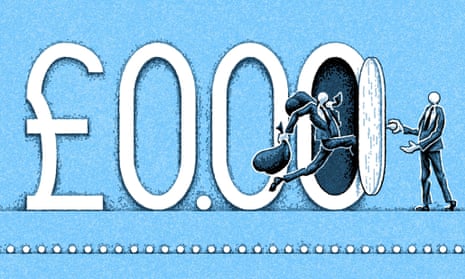Last Monday, as the prime minister rehearsed his Manchester conference speech, a story appeared in this newspaper that showed you who really runs this country – and how. It revealed that one of Britain’s largest companies, AstraZeneca, paid absolutely no corporation tax here in both 2013 and 2014, despite racking up global profits in those years of £2.9bn.
At first glance this sounded like an everyday tale of Mega-Business Making a Mockery of Our Tax Laws, to be filed alongside Google, Starbucks – or this weekend’s disclosure that Facebook paid less to the exchequer last year than you probably did. But this story is bigger. It’s less about accountancy than where power lies in 21st-century Britain.
Astra’s tax maestro is called Ian Brimicombe, and he is more than well-known at the Treasury: he is a trusted adviser. Shortly after George Osborne took over as chancellor in 2010, his team began rewriting the rules on how big businesses are taxed. To help, the government appointed senior executives from some of Britain’s giant companies to a “liaison committee”, comprising Astra’s Brimicombe, representatives from Tesco, Santander, BP and others.
Although the group was not widely reported, there was no disguising its purpose. In the Treasury’s own blunt words, the businesspeople were providing “strategic oversight of the development of corporate tax policy”.
Corporation tax alone is one of the biggest earners for the government, worth over £50bn a year – and now companies with millions, even billions of pounds at stake were to be given direct say on how they should be taxed.
The Treasury set up working groups specifically to advise on taxing multinational business – fitted out with directors from 40 multinationals, all with extensive networks of offshore subsidiaries. In his book The Great Tax Robbery, the former tax inspector Richard Brooks records that a Vodafone representative was put on the group “deciding how to tax offshore financing of exactly the sort his company was running through Luxembourg and Switzerland for hundreds of millions of pounds in tax saving every year”.
The new regime for multinationals began in 2013. Within five months, AstraZeneca had set up an unusual and intricate Dutch tax avoidance structure that would enable it to take full advantage of the new loopholes it had so helpfully advised on. To call this a conflict of interests is to miss the point – it’s far too brazen for that. Osborne’s Treasury blithely invited in some of the country’s biggest businesses and asked them to help design their own tax regimes. It’s like trawlermen asking fish to design their nets, or the Highways Agency allowing Jeremy Clarkson to set his own speed limit.
It might even be funny – if all these giveaways didn’t cost hundreds of millions amid a decade of belt-tightening. In their original assessment, Treasury officials calculated that the relaxation of the controlled foreign company rules would cost the public around £840m by this tax year. That’s getting on for the equivalent of three brand-new, fully staffed hospitals. The year 2013 also marked the start of the most severe cuts to social security, including the introduction of the bedroom tax. That particular cut has inflicted panic and upheaval on some of the poorest households in Britain, yet going by academic research it raises less half the amount given away to multinationals by the new controlled foreign company rules.
I write this – but we’re not even allowed to know how much money we’re giving away to Astra, Tesco and the rest. The Treasury’s initial assessment of the new rules came with a vital postscript: “The government would welcome evidence from business to help it refine the estimates of the elements of cost of the CFC reform.” Or, translated from the mandarin: this is guesswork.
When the tax-justice campaigner George Turner submitted a freedom of information request last month to find out how much the new system was costing taxpayers, Osborne’s department told him it would take too much time to find out. Turner persisted: what about the new patent box tax break, originally set to cost the public £900m? No luck there either. So ordinary taxpayers may have kissed goodbye to £1.8bn in school places and Sure Start schemes – or they may have lost a lot more. We won’t be told what’s happened to our own money.
These tax breaks aren’t in aid of struggling small businesses or innovative new tech firms: they are going into the coffers of the biggest companies in Britain, with their platoons of lobbyists and tax advisers and their web of connections into Whitehall.
The year before the government brought in these new tax breaks, AstraZeneca was granted £5m to encourage it to expand its research site at Alderley Park in Cheshire – money that the local MP (one G Osborne of Tatton) played a key role in securing. Just five months later, the drugs giant announced it was closing the centre, with the immediate loss of 550 jobs. From 2007-14, calculates York University’s Kevin Farnsworth, AstraZeneca took £91.3m in joint public funding from the government’s Innovate UK research group.
Britain is in the middle of a cold, austere decade. Ordinary taxpayers are having to tighten their belts – even while multinationals are being lavished with public cash. Osborne and Cameron tell tax-avoiding companies to “wake up and smell the coffee”, yet undercut the rest of Europe on taxes so as to lure Starbucks to put their offices in the UK. Tax avoidance is normally painted as big businesses finding and exploiting loopholes; but the Conservatives are now allowing those same outfits to design their own loopholes.
“Upwards redistribution” is how the Berkeley academic Gabriel Zucman describes it: taking from ordinary taxpayers and giving to the very richest. Zucman is a sometime co-author with Thomas Piketty and his new book The Hidden Wealth of Nations is set to do for tax havens what his colleague’s did for wealth inequality: define and popularise the problem.
“Britain is now engaged in the most extreme form of tax competition anywhere in Europe,” he told me this weekend. “It’s trying to become a tax haven.” This is what economic competence now looks like in the UK: an officially driven attempt to turn a developed country into a competitor to the Cayman Islands, with lavish handouts for those who can afford it, and cuts for those who can’t.

